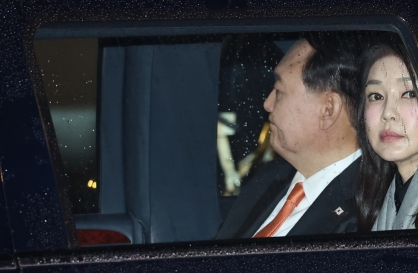Baby boomers’ quality of life falls in 2012: MetLife
By Korea HeraldPublished : May 2, 2013 - 20:01
South Korean baby boomers’ quality of life apparently deteriorated in 2012 from two years earlier, as they were forced to spend more on health care and children’s education despite decrease in income, data showed Thursday.
According to the data by MetLife Mature Market Institute and Seoul National University, the baby boomers’ expenditures on children education jumped 27.2 percent over the cited period, while they spent 14.6 percent less on leisure activities.
In contrast, their average monthly income fell 0.03 percent to 2.83 million won ($2,600) last year, the data showed.
The research was based on 3,275 baby boomers born between 1955 and 1963 in South Korea.
They used to be the main drivers for the country’s economic development and are estimated to account for 17 percent of the economically active population.
“The increased expenditures on children came mainly as baby boomers spent more on education,” said Han Gyoung-hae, a professor of consumer and child studies at Seoul National University.
Medical expenses also moved up 11.5 percent last year from 2010 due to the baby boomers getting older.
In 2012, they spent 10.1 million won on college tuition for their children and 39 million won on wedding costs, which also came as a major burden to baby boomers who are faced with a decline in income after retirement.
In contrast with their increased overall spending, the number of baby boomers with private pensions and insurance plans declined over the cited period.
The portion of baby boomers subscribed to private pension plans came to 38 percent in 2012, down 6 percentage points from two years earlier, and those with private insurance programs also declined 5 percentage points to 77 percent.
The unemployment rate among South Korean baby boomers surveyed stood at 22.9 percent in 2012, while 27.9 percent had full-time jobs. An additional 16.2 percent had temporary work, and 24 percent were self-employed.
“The government as well as the market should make efforts in generating jobs for baby boomers, as more South Koreans are searching for another job after their retirement,” Han added. (Yonhap News)
According to the data by MetLife Mature Market Institute and Seoul National University, the baby boomers’ expenditures on children education jumped 27.2 percent over the cited period, while they spent 14.6 percent less on leisure activities.
In contrast, their average monthly income fell 0.03 percent to 2.83 million won ($2,600) last year, the data showed.
The research was based on 3,275 baby boomers born between 1955 and 1963 in South Korea.
They used to be the main drivers for the country’s economic development and are estimated to account for 17 percent of the economically active population.
“The increased expenditures on children came mainly as baby boomers spent more on education,” said Han Gyoung-hae, a professor of consumer and child studies at Seoul National University.
Medical expenses also moved up 11.5 percent last year from 2010 due to the baby boomers getting older.
In 2012, they spent 10.1 million won on college tuition for their children and 39 million won on wedding costs, which also came as a major burden to baby boomers who are faced with a decline in income after retirement.
In contrast with their increased overall spending, the number of baby boomers with private pensions and insurance plans declined over the cited period.
The portion of baby boomers subscribed to private pension plans came to 38 percent in 2012, down 6 percentage points from two years earlier, and those with private insurance programs also declined 5 percentage points to 77 percent.
The unemployment rate among South Korean baby boomers surveyed stood at 22.9 percent in 2012, while 27.9 percent had full-time jobs. An additional 16.2 percent had temporary work, and 24 percent were self-employed.
“The government as well as the market should make efforts in generating jobs for baby boomers, as more South Koreans are searching for another job after their retirement,” Han added. (Yonhap News)
-
Articles by Korea Herald



![[AtoZ Korean Mind] Does your job define who you are? Should it?](http://res.heraldm.com/phpwas/restmb_idxmake.php?idx=644&simg=/content/image/2024/05/06/20240506050099_0.jpg&u=)















![[K-pop's dilemma] Is Hybe-Ador conflict a case of growing pains?](http://res.heraldm.com/phpwas/restmb_idxmake.php?idx=642&simg=/content/image/2024/05/07/20240507050746_0.jpg&u=)